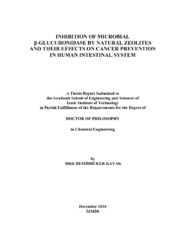Please use this identifier to cite or link to this item:
https://hdl.handle.net/11147/2875Full metadata record
| DC Field | Value | Language |
|---|---|---|
| dc.contributor.advisor | Ülkü, Semra | en |
| dc.contributor.author | Demirbüker Kavak, Dilek | - |
| dc.date.accessioned | 2014-07-22T13:48:31Z | - |
| dc.date.available | 2014-07-22T13:48:31Z | - |
| dc.date.issued | 2010 | en |
| dc.identifier.uri | http://hdl.handle.net/11147/2875 | - |
| dc.description | Thesis (Doctoral)--Izmir Institute of Technology, Chemical Engineering, Izmir, 2010 | en |
| dc.description | Includes bibliographical references (leaves: 232-250) | en |
| dc.description | Text in English; Abstract: Turkish and English | en |
| dc.description | xviii, 281 leaves | en |
| dc.description.abstract | Bacterial β-glucuronidase (GUS) enzyme has an important role in the production of reactive metabolites related to some diseases and cancer development. In this thesis, health promoting role of clinoptilolite rich zeolite mineral was proposed to act as a potential inhibitor and as adsorbant of GUS and also to have cytotoxic effect towards cancer cells. Therefore inhibition and adsorption mechanism of GUS by clinoptilolite rich mineral and its cytotoxicity towards cancer cells were investigated. Additionally, another potential inhibitor; casein and their interactions with GUS and clinoptilolite rich mineral were revealed. Results showed that GUS activity was inhibited by either casein or clinoptilolite rich mineral and both of them acted as mixed type inhibitors. Additionally, it was found that clinoptilolite rich mineral was a potential adsorbent for GUS. Results showed that removal percentages of proteins were 9.4-54.4 % and 36.5-77.3 % for GUS and casein, respectively and depended on their initial concentrations. Equilibrium studies showed that both adsorptions were exothermic and physical and kinetic models implied that external fluid film or skin resistance, and intraparticle diffusion might be effective for GUS and casein adsorption, respectively. In cytotoxicity tests, clinoptilolite rich mineral (25mg/ml) inhibited approximately 50 % of the Caco-2 cell proliferation. This high inhibition was not observed for MCF-7 cells where inhibition was found to be 20-30 %. Flow cytometric results for both cell lines indicated that total apoptosis percentage in overall population was low compared to control sample. This result was also confirmed by cell cycle analyses. | en |
| dc.language.iso | en | en_US |
| dc.publisher | Izmir Institute of Technology | en |
| dc.rights | info:eu-repo/semantics/openAccess | en_US |
| dc.subject.lcsh | Beta-glucuronidase genes | en |
| dc.subject.lcsh | Cancer--Research | en |
| dc.subject.lcsh | Zeolites | en |
| dc.title | Inhibition of microbial ß-glucuronidase by natural zeolites and their effects on cancer prevention in human intestinal systems | en_US |
| dc.type | Doctoral Thesis | en_US |
| dc.department | Thesis (Doctoral)--İzmir Institute of Technology, Chemical Engineering | en_US |
| dc.relation.publicationcategory | Tez | en_US |
| item.openairetype | Doctoral Thesis | - |
| item.openairecristype | http://purl.org/coar/resource_type/c_18cf | - |
| item.grantfulltext | open | - |
| item.languageiso639-1 | en | - |
| item.cerifentitytype | Publications | - |
| item.fulltext | With Fulltext | - |
| crisitem.author.dept | 03.08. Department of Food Engineering | - |
| Appears in Collections: | Phd Degree / Doktora | |
Files in This Item:
| File | Description | Size | Format | |
|---|---|---|---|---|
| T000868.pdf | DoctoralThesis | 5.9 MB | Adobe PDF |  View/Open |
CORE Recommender
Page view(s)
156
checked on Aug 5, 2024
Download(s)
228
checked on Aug 5, 2024
Google ScholarTM
Check
Items in GCRIS Repository are protected by copyright, with all rights reserved, unless otherwise indicated.